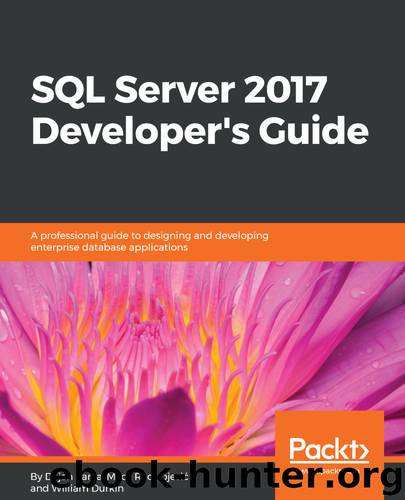SQL Server 2017 Developer's Guide by Dejan Sarka

Author:Dejan Sarka
Language: eng
Format: epub
Tags: COM051170 - COMPUTERS / Programming Languages / SQL, COM021050 - COMPUTERS / Databases / Servers, COM021030 - COMPUTERS / Databases / Data Mining
Publisher: Packt Publishing
Published: 2018-07-06T12:14:51+00:00
Predicate-based Row-Level Security
Using programmable objects for RLS protects sensitive data very well because users don't have direct access to the tables. However, the implementation of such a security might be very complex for existing applications that don't use stored procedures, and other programmable objects. This is why SQL Server 2016 and 2017 include predicate-based RLS. A DBA creates the security filters and policies. The new security policies are transparent to the application. RLS is available in the Standard, Enterprise, and Developer editions. There are two types of RLS security predicates:
Filter predicates that silently filter the rows the application reads. For these predicates, no application change is needed. Note that, besides reading, filter predicates also filter the rows when an application updates or deletes the rows; this is because the application again simply does not see the filtered rows.
Block predicates that explicitly block write operations. You can define them for after-insert and after-update operations, when the predicates block inserts or updates that would move a row beyond the scope of the block predicate. After-insert block predicates also apply to minimally logged or bulk inserts. You can also define block predicates for before-update and before-delete operations, when they serve as filter predicates for the updates and deletes. Note that if you already use filter predicates, before-update and before-delete predicates are not needed. You might want to change the affected applications to catch additional errors produced by block predicates.
Download
This site does not store any files on its server. We only index and link to content provided by other sites. Please contact the content providers to delete copyright contents if any and email us, we'll remove relevant links or contents immediately.
Algorithms of the Intelligent Web by Haralambos Marmanis;Dmitry Babenko(18250)
Azure Data and AI Architect Handbook by Olivier Mertens & Breght Van Baelen(7693)
Building Statistical Models in Python by Huy Hoang Nguyen & Paul N Adams & Stuart J Miller(7681)
Serverless Machine Learning with Amazon Redshift ML by Debu Panda & Phil Bates & Bhanu Pittampally & Sumeet Joshi(7549)
Driving Data Quality with Data Contracts by Andrew Jones(7323)
Data Wrangling on AWS by Navnit Shukla | Sankar M | Sam Palani(7314)
Machine Learning Model Serving Patterns and Best Practices by Md Johirul Islam(7043)
Learning SQL by Alan Beaulieu(6282)
Weapons of Math Destruction by Cathy O'Neil(6270)
Big Data Analysis with Python by Ivan Marin(5966)
Data Engineering with dbt by Roberto Zagni(4949)
Solidity Programming Essentials by Ritesh Modi(4589)
Time Series Analysis with Python Cookbook by Tarek A. Atwan(4418)
Pandas Cookbook by Theodore Petrou(4105)
Blockchain Basics by Daniel Drescher(3577)
Natural Language Processing with Java Cookbook by Richard M. Reese(3167)
Hands-On Machine Learning for Algorithmic Trading by Stefan Jansen(3071)
Learn T-SQL Querying by Pam Lahoud & Pedro Lopes(2959)
Feature Store for Machine Learning by Jayanth Kumar M J(2938)
